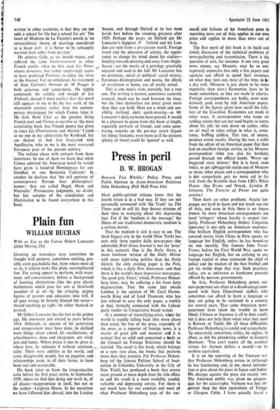Plain fun
WILLIAM BUCHAN
Growing up nowadays may sometimes be fraught with purpose, sometimes exciting, pos- sibly even psychedelic but, from where most of us sit, it seldom looks like plain, uncomplicated fun. The young appear to perform, with maxi- mum self-consciousness, before a background of looming abstractions (like the grey plastic battlements which pass for sets at Stratford) peopled—if at all—by the cringing, pygmy figures of parents and educators who will, if all goes wrong, be fiercely blamed but never— should anything go right—be either thanked or praised.
Mr Osbert Lancaster has his feet in the golden age. His memories just extend to years before 1914. Although, as anyone of his generation and temperament must have done, he disliked most things about school, his recollections, of schoolmasters, dons and clergymen, are vivid, just and funny. Where praise is due he gives it; where love, he indicates it without sentimen-.4„. tality. There were oddities in his world, and some disagreeable people, but no pygmies, and relationships seem, in all their forms, to have been real and savourable.
His book takes us from the irreproducible calm before the first great storm, to September 1939, where we find him doing an work in, of all places—inappropriate in itself, but not to the author—Leighton House. In the meantime we have followed him abroad, into the London Season, and through Oxford at its last most lavish best before the creeping greyness after 1929. Perhaps the pages on Oxford are Mr Lancaster's happiest. 1-1 Oxford and his Lon- don are seen from a prosperous world. Foreign travel and the pleasures of society, the oppor- tunity to change his mind about his studies— bending towards drawing and away from Anglo- Saxon—are the marks of a privilege gratefully enjoyed and used to the full. Mr Lancaster has no pretences, social or political; social misery, European disintegration and mania, the effects of revolution at home, are all coolly noted.
This is one man's view, certainly, bet a true one. The writing is mature, sometimes austerely ironical; much can be read between the lines, but the lines themselves are never given more than they can hold. Here are a mind and sen- sibility civilised, alert, quick-moving—as Mr Lancaster's daily cartoons have proved. It would be a pleasure to quote from this book at length, especially portraits of friends, and some pene- trating remarks on the pre-war smart beguin for things Teutonic; even more so if the pictures (plenty of these) could be 'quoted' as well.






























 Previous page
Previous page